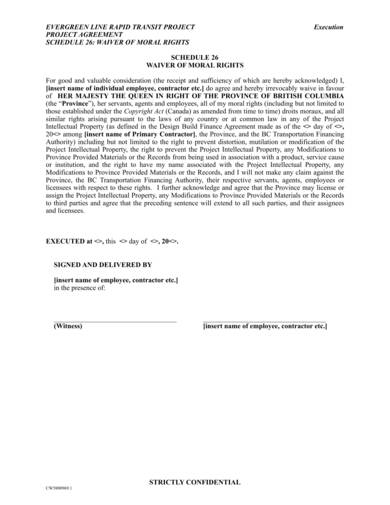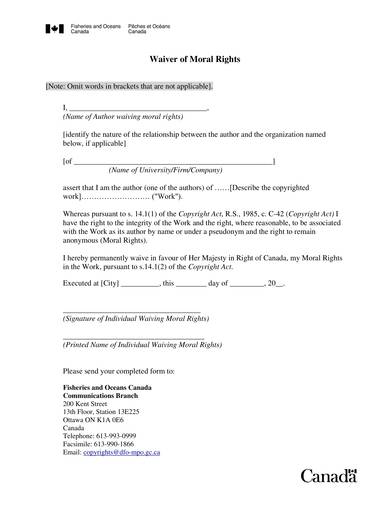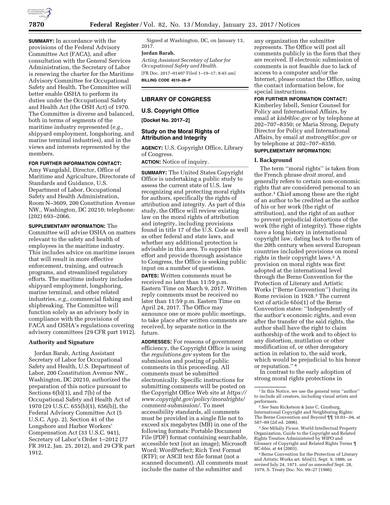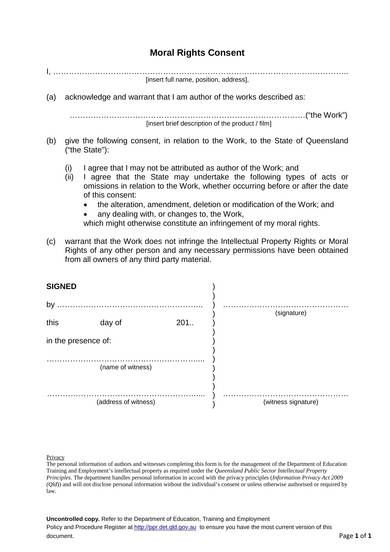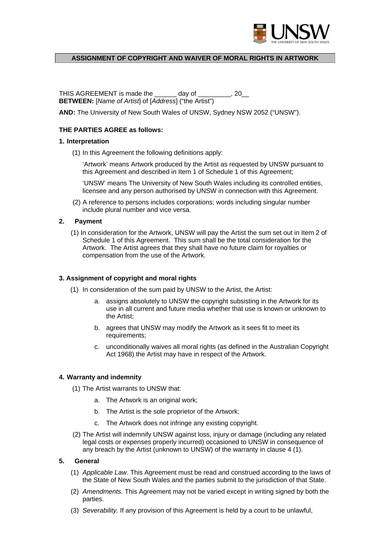In a world full of accusations, false testimonies, and unreliable copyright agreements, being politically correct is a pain in the neck. But, you can rest assured that even though it’s easy for many to say that it’s their original piece, few can back it up. In fact, for any business that specializes in content creation, you will need a reliable document that’s easy to understand and can bare its teeth in court—something like a waiver of moral rights.
What are Waivers for Moral Rights?
As instigated by the law, all people have certain rights—granted they come with particular obligations—that must be observed. One such right are moral rights, which tackles the dilemma of intellectual property. While you may not be familiar with this term, you might be more familiar with the word “copyright.” Copyright is associated with various works of art, literature, and even modern-day movies and TV shows. In laymen’s terms, copyright has a way of giving ownership to the creator of the above-mentioned forms of media. And, through the power of reasoning, you’ll learn that this is what morals rights are.
With the rise of production companies such as blog sites and online advertisement services, copyright becomes quite the challenge to meet. The devastation that comes with a plagiarism complaint letter that companies could face is massive, possibly in the millions of dollars worth of compensation. How could this happen? If either a current or a former employee decides to claim ownership of the work they published under your business’ name. This is why most content-creation companies include a waiver of moral rights within their employee agreements. Like most waiver forms, a waiver of moral rights provides documentation of an employee letting go of their right to file lawsuits against you by reclaiming the work they’ve done for your company.
Smile and Waive
Here’s the tricky part about a waiver: it needs to be understandable to both your client and the blind eyes of the court. This means that confusing your prospect into signing a contract agreement they don’t understand is out of the question—not to mention unethical. So now the question becomes, “how do you get someone to relinquish their moral rights?” Well, first and foremost, as with any employee-company transaction, be direct to the point. Help them understand that this is a company necessity for its safety, and, in return, the benefits of their employment will provide them their security. The best approach to this predicament is with a warm smile and a well-understood waive.
Sample Waiver of Moral Rights
The notorious complications of an ill-drafted waiver are found within court records and lawsuits. So there’s no reason to risk it: use this sample templates when drafting your document today.
1. Waiver of Moral Rights in Visual Artworks
2. Project Agreement Waiver of Moral Rights
3. Sample Waiver of Moral Rights
4. Study of Waiver of Moral Rights
5. Research Agreement Waiver of Moral Rights
6. Waiver of Moral Rights Consent Form
7. Assignment of Copyright and Waiver of Moral Rights in Artwork
How to Create a Waiver of Moral Rights
Though it is highly advised to consult a lawyer when writing a waiver of moral rights, this doesn’t mean you can’t make one yourself. However, unlike other garden-variety documents, this type of waiver requires a tad more finesse. With that said, if you need well-written text but don’t have the time or funding for a licensed attorney consultation, here are a few tips and tricks for you.
1. Start with a Disclaimer
Though most often used as agreement and website disclaimers, they’re also exceedingly useful–borderline necessary–to waivers of moral rights. What disclaimers provide is a forewarning to the reader about what they’re getting themselves into. Much like an introduction, they also establish the tone of the entire waiver and set your reader’s expectations.
2. Include Essential Details
Legal agreements aren’t the only documents that are painstakingly demanding with detail; perhaps a waiver of moral rights can give it a good run for its money. When writing your text, don’t forget to include essential particulars such as the date, party aliases and names, and signatories of recognition.
3. Provide a Scope of Risks
You don’t have to go full-blown risk assessment on your document, as long as you highlight the possible threats. This is true for all waivers, and a waiver of moral rights is no exception. Even if the risk is something like giving up your copyright, it’s still best to provide your reader with this knowledge via a clause in your text.
4. Make Your Intent Clear
Whether they sign it or not is up to them, but it’s still your responsibility to make your intent clear. So don’t beat around the bush and be straight to the point. When writing your waiver, your text must be clear, simple, and understandable to your reader to avoid legal repercussions.
Production companies use waivers of moral rights regularly to ensure the security of their business. However, this doesn’t mean that they’re selfish, thieving, and inhuman. When facing documents like this, it’s hard to integrate the practices of shrewd business people with compassion, understanding, and civility. Yet, when all is said and done, it isn’t the papers that define a business’ reputation, but how they handle their employees and how they uphold their rights to a reliable source of income.
Related Posts
FREE 3+ Construction Equipment Lease Proposal Samples in PDF | MS Word | Apple Pages | Google Docs
FREE 7+ Property Purchase Contract Samples in PDF | MS Word | Google Docs
FREE 3+ Agile User Story Samples in PDF
Deed of Assignment
Contract Termination Letter
Witness Letter
Community Petition
Research Interest Statement
Awarding Contract Letter
FREE 10+ Catering Service Proposal Samples in PDF | MS Word | Apple Pages | Google Docs
FREE 5+ Profile Summary Samples in PDF
FREE 7+ Death Investigation Report Samples in PDF
FREE 22+ Sample Business Contract Templates in Google Docs | MS Word | Pages
Salon Price List Samples & Templates
Employee Contract Samples & Templates


